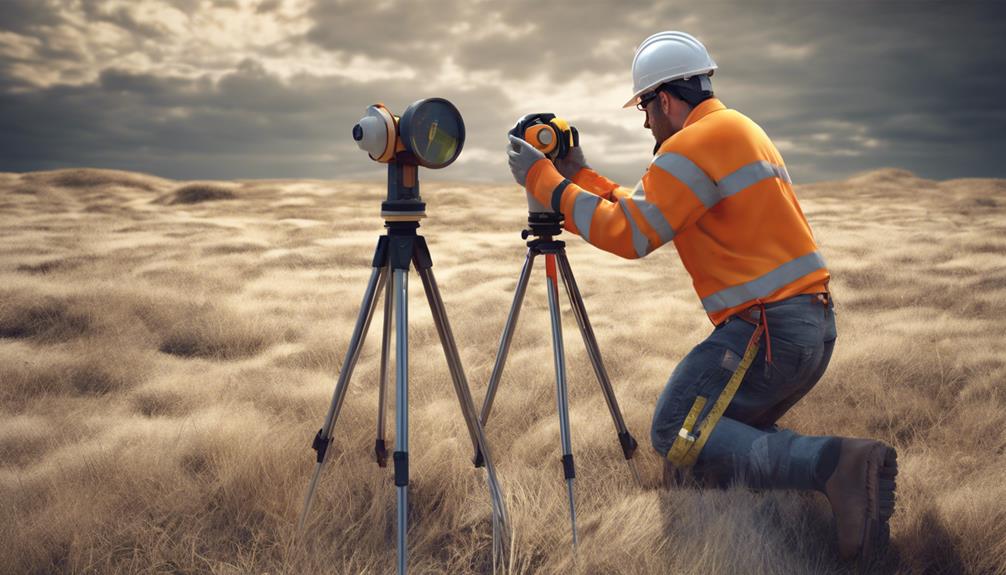Surveyor Job Description
As a surveyor, you'll tackle field challenges, utilize GPS systems, and guarantee data accuracy for projects. Analyze data, use specialized software, and create reports in the office. A bachelor's degree in surveying or related field is typically needed, with some preferring a master's. Proficiency in field techniques, attention to detail, and strong analytical skills are essential. Master tools like total stations, drones, and laser scanners. Specialize in areas like geodesy or hydrographic surveying for industry opportunities. Certifications like CST or CFedS aid in professional growth. Embrace advancements in technology for enhanced surveying techniques and job prospects.
Key Takeaways
- Fieldwork challenges like adverse weather conditions are common in surveying.
- Proficiency in using surveying tools like GPS systems and drones is essential.
- Data accuracy is crucial for reliable project results.
- Specialized software for mapping and drafting is utilized in surveying tasks.
- Communication and problem-solving skills are important for collaboration in surveying projects.
Surveyor Job Description Overview
When considering the Surveyor Job Description Overview, it's important to understand the primary responsibilities and tasks associated with this profession. Surveyors face various fieldwork challenges, such as working in difficult terrain or adverse weather conditions. However, with technology advancements like GPS systems and drones, surveyors can now overcome many of these obstacles and enhance the efficiency of their work.
Data accuracy is a critical aspect of a surveyor's job. They must make sure that measurements and collected information are precise to produce reliable results. This attention to detail is essential for various projects, from land development to construction planning. In addition to fieldwork, surveyors also engage in office tasks like analyzing data, preparing reports, and utilizing specialized software for mapping and drafting purposes.
Educational Requirements for Surveyors
To become a surveyor, you must typically obtain a bachelor's degree in surveying or a related field. Degree requirements for surveyors often include coursework in mathematics, geomatics, geography, and engineering. A bachelor's degree program in surveying typically takes four years to complete and provides the necessary foundation for a career in surveying. Additionally, some employers may prefer candidates with a master's degree in surveying or a related field, which can offer advanced knowledge and skills in the field.
After completing the required education, aspiring surveyors must go through the licensing process to practice professionally. This process typically involves passing the Fundamentals of Surveying (FS) exam, gaining relevant work experience under a licensed surveyor, and then passing the Principles and Practice of Surveying (PS) exam. Once these steps are completed, individuals can apply for licensure in their respective state. Licensing confirms that surveyors meet the necessary standards and qualifications to perform surveying work accurately and ethically.
Key Skills and Qualities Needed
Developing a diverse skill set and possessing specific qualities are essential for success as a surveyor. Proficiency in fieldwork techniques is vital, as surveyors spend a significant amount of time collecting data outdoors. This includes understanding how to use surveying instruments accurately and effectively. Attention to detail is paramount, as even small errors in measurements can have significant consequences.
Additionally, strong skills in data entry and record-keeping are essential for surveyors. The ability to accurately input data collected from the field into computer software and maintain organized records is crucial for producing precise and reliable survey reports. Surveyors must also possess excellent analytical skills to interpret data correctly and draw accurate conclusions.
Furthermore, communication skills are key for surveyors to effectively collaborate with team members and clients, ensuring that project requirements are met. Adaptability and problem-solving skills are also important in this role, as surveyors often encounter unexpected challenges during fieldwork that require quick thinking and innovative solutions.
Understanding Surveying Tools and Technologies
For a surveyor, mastering the understanding of surveying tools and technologies is vital for accurate data collection and analysis. Surveying technology has seen significant advancements in recent years, with the introduction of GPS systems, drones, and 3D laser scanning tools. These technological advancements have revolutionized the way surveys are conducted, making data collection more efficient and precise.
Surveyors must be well-versed in a variety of surveying equipment and techniques to guarantee the accuracy of their work. This includes the use of total stations for measuring angles and distances, levels for determining elevation differences, and GNSS receivers for precise positioning. Understanding how to operate and calibrate these tools is essential for obtaining reliable survey data.
In addition to traditional surveying methods, surveyors now have access to cutting-edge technologies like LiDAR and aerial photogrammetry, which allow for detailed mapping and modeling of terrains. By staying up-to-date with the latest surveying tools and technologies, surveyors can enhance the quality of their work and provide clients with more accurate and detailed survey data.
Fieldwork Duties and Responsibilities
Mastering the fieldwork duties and responsibilities is vital for you as a surveyor to guarantee accurate data collection and analysis. When conducting fieldwork, you'll encounter various challenges that require your attention and problem-solving skills. Ensuring proper equipment maintenance is important to avoid inaccuracies in your surveys and to uphold professional standards. Here are some key points to keep in mind:
- Fieldwork Challenges: Be prepared to tackle unpredictable weather conditions, difficult terrains, and unexpected obstacles during field surveys.
- Equipment Maintenance: Regularly calibrate and check your surveying tools to make sure they're functioning correctly and providing accurate measurements.
- Data Accuracy: Double-check all collected data in the field to minimize errors and discrepancies before proceeding with the analysis back in the office.
Office Responsibilities and Documentation
Maintain data entry accuracy is upheld at all times to guarantee the integrity of surveying information.
Implement record-keeping procedures diligently to organize and store data efficiently for future reference.
These tasks are essential in maintaining the quality and reliability of survey documentation.
Data Entry Accuracy
To maintain high data entry accuracy in your office responsibilities and documentation, meticulous attention to detail is paramount. Ensuring data accuracy is essential for precise data analysis and reliable reporting.
Here's how you can achieve this:
- Double-check all entered data for accuracy before finalizing.
- Utilize data validation tools to minimize errors and inconsistencies.
- Regularly update and maintain data entry guidelines to streamline the process and guarantee consistency.
Record Keeping Procedures
Maintaining meticulous record-keeping procedures is vital to guarantee the accuracy and reliability of office responsibilities and documentation. In the domain of data management, effective record keeping involves organizing information systematically to guarantee easy access and retrieval. By implementing thorough record-keeping protocols, surveyors can enhance record accuracy and streamline operations.
Data management practices such as categorizing records, establishing version control, and maintaining backups are essential for safeguarding information integrity. Regularly updating and auditing records also play a pivotal role in ensuring that the data remains current and error-free. Through diligent adherence to record-keeping procedures, surveyors can uphold the highest standards of accuracy and professionalism in their documentation practices.
Career Paths and Advancement Opportunities
As a surveyor, you can explore various career paths that offer job growth opportunities, including roles in land development, construction, and environmental sectors.
Advancing in this field often involves obtaining specialized training and certifications to enhance your skills and knowledge base.
Specialization options such as geodetic surveying, hydrographic surveying, or photogrammetry can open up new avenues for career progression and professional development.
Job Growth Opportunities
Exploring the various career paths and advancement opportunities available for surveyors reveals a diverse range of options for professional growth. As the job market for surveyors continues to expand, so does the earning potential. Here are some key aspects to explore:
- Specialization: Surveyors can specialize in areas such as land surveying, hydrographic surveying, or geodetic surveying, allowing for in-depth expertise.
- Management Roles: With experience, surveyors can move into managerial positions, overseeing projects and teams.
- Consulting Opportunities: Surveyors can work as consultants, offering their expertise to businesses, government agencies, or private clients for a varied and challenging career path.
These options provide avenues for surveyors to progress and excel in their field.
Training and Certifications
To advance in the field of surveying and explore diverse career paths, obtaining relevant training and certifications is essential for professional growth and opportunities. Surveyors typically need to meet licensing requirements to practice legally. This often involves passing the Fundamentals of Surveying (FS) exam and the Principles and Practice of Surveying (PS) exam, which are administered by the National Council of Examiners for Engineering and Surveying (NCEES). Additionally, continuing education opportunities are vital for staying up-to-date with the latest technology, regulations, and best practices in the field. Many surveyors pursue certifications such as Certified Survey Technician (CST) or Certified Federal Surveyor (CFedS) to demonstrate their expertise and enhance their career prospects.
| Training & Certifications | Description | Relevance |
|---|---|---|
| Licensing requirements | Passing FS and PS exams | Legal practice requirement |
| Continuing education | Pursuing CST or CFedS | Staying updated with industry standards |
Specialization Options
An array of specialization options in surveying offers diverse career paths and opportunities for professional advancement. Surveyors have the chance to specialize in various areas, leading to fulfilling career paths. Embracing advanced technologies in surveying can open up new avenues for growth and development. Here are some key points to contemplate:
- Specialization choices: Surveyors can specialize in fields such as geodesy, hydrographic surveying, or photogrammetry.
- Career paths: Specializing in a particular area can lead to opportunities in industries like construction, urban planning, or environmental conservation.
- Advanced technologies: Embracing cutting-edge tools like drones, LiDAR, and GIS software can enhance surveying techniques and contribute to job growth in the field.
Frequently Asked Questions
Do Surveyors Need to Have a Specialized License or Certification?
Yes, surveyors typically need specialized training and must obtain a license to practice legally. Licensing restrictions vary by location, but having the appropriate credentials is essential for ensuring accuracy and compliance in surveying work.
What Are the Typical Work Hours for Surveyors?
In the surveying field, your work hours can vary depending on project timelines and deadlines. Field challenges like terrain and weather conditions may require flexibility. Effective time management is vital to balance fieldwork and office tasks efficiently.
Is There a Difference Between a Land Surveyor and a Construction Surveyor?
Yes, there is a difference between a land surveyor and a construction surveyor. Land surveyors primarily focus on property boundaries and topographical features, while construction surveyors are more involved in setting out precise measurements for building projects and ensuring accuracy during construction.
How Does Weather or Environmental Conditions Impact Surveying Work?
Weather and environmental conditions have a notable impact on surveying work. Heavy rain or fog can diminish visibility, impacting accuracy. Extreme temperatures can influence equipment performance and maintenance, necessitating additional attention to guarantee precise measurements and data collection.
Are There Any Specific Safety Precautions Surveyors Need to Follow in the Field?
When out in the field, as a surveyor, it's important to prioritize safety. Make sure to wear proper safety equipment and maintain constant hazard awareness. These precautions are essential for your well-being and the success of your work.
Conclusion
To sum up, being a surveyor requires a unique blend of technical skills, attention to detail, and the ability to work both in the field and in an office setting.
While some may argue that the job can be physically demanding, the rewards of accurately mapping and measuring land for various purposes make it a fulfilling career choice.
With the right education and experience, surveyors have the opportunity to advance in their field and take on more challenging projects.







